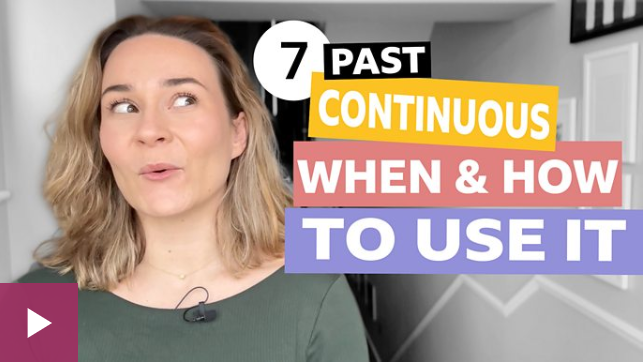USES OF PAST CONTINUOUS
For continuous actions happening at a particular time in the past.
- What were you doing last night? You were so noisy!
- I was practising the guitar.
- I didn’t see you last year because I was travelling around Asia.
Useful vocabulary for continuous actions happening at a particular time in the past: this morning, yesterday, last night/week/month/year, two weeks ago, in (year)
To describe two or more actions happening at the same time in the past.
- While Emma was cooking, the dog was watching and waiting for crumbs.
- Matthew was reading a book, while his brother was playing video games.
Useful vocabulary for actions happening simultaneously: while, as
Similarly, this is used to describe background events in stories.
- Outside the Sun was shining, the birds were singing and the trees were swaying in the breeze.
- In the lively city square, street performers were entertaining the crowd, children were playing and the fountain was sparkling in the sunlight.
For a background event that was interrupted by another event, combine it with the past simple.
- I was working on my computer when the battery died.
- We were looking at the sky, when suddenly the fireworks started.
For activities that were repeated a lot.
- We were constantly playing in the streets as kids.
- The car was always failing at the worst moments.
Useful vocabulary for activities that were repeated a lot: constantly, always, consistently, regularly, repeatedly, continually, perpetually
STRUCTURE
For positive sentences, use ‘was’ or ‘were’ after the pronoun, then add ‘-ing’ to the main verb.
- I was walking
- You were walking
- He was walking
- She was walking
- It was walking
- We were walking
- They were walking
For negative sentences, add ‘not’ after ‘was’ or ‘were’. We usually contract the form with an apostrophe.
- I was not walking > I wasn’t walking
- You were not walking > You weren’t walking
- He was not walking > He wasn’t walking
- She was not walking > She wasn’t walking
- It was not walking > It wasn’t walking
- We were not walking > We weren’t walking
- They were not walking > They weren’t walking
To ask yes/no questions, change the order of the sentence so ‘was’ or ‘were’ is at the beginning.
- Was I walking?
- Yes, you were
- No, you weren’t
- Were you walking?
- Yes, I was
- No, I wasn’t
- Was he walking?
- Yes, he was
- No, he wasn’t
- Was she walking?
- Yes, she was
- No, she wasn’t
- Was it walking?
- Yes, it was
- No, it wasn’t
- Were we walking?
- Yes, we were
- No, we weren’t
- Were they walking?
- Yes, they were
- No, they weren’t
To ask for more information, add the ‘who, what, where, why, how, when’ question words at the beginning.
- Why was I walking?
- Who were you walking with?
- Where was he walking?
- When was she walking?
- How were they walking?
